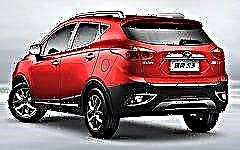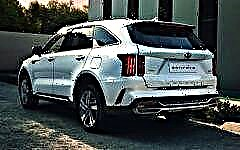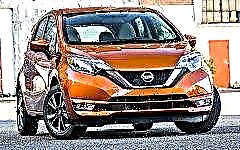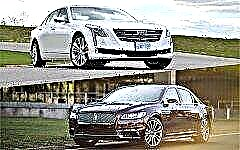

The content of the article:
- Benefits of gas fuels
- Disadvantages of using HBO
As a rule, if a driver tries to drive a car on gas, he certainly wants to switch the gasoline engine to this type of fuel only. In addition, those drivers who, for technical reasons, could not switch the injector to gas, and those who have never operated the engine on gas, oppose the use of a propane-butane mixture on cars.
So, what to choose for a car, gas or petrol? Let's analyze the advantages, disadvantages and myths associated with gas equipment on a car.
Benefits of gas fuels

Price
This is the main argument in favor of converting a gasoline engine to use gas - the price per liter of gas is lower than a liter of gasoline, as a rule, by 35-40%. Despite the fact that the gas consumption exceeds the consumption of gasoline on a suburban highway, the recoupment of HBO and the subsequent savings will come no later than 18 months. To reduce the consumption of gas fuel, additional adjustment of the gas cylinder set should be carried out.
For comparison: Daewoo Lanos spends about 9 liters when moving on city streets. When switching to gas, the installation of 5th generation equipment (about 360 euros) will pay off in 8 months, provided that the daily mileage is at least 100 kilometers.
More powerful cars, for example, the Infiniti Qx56 with a flow rate of 22 liters or more in urban areas, will pay off the installation of gas equipment in 3-4 months.
Exhaust
Waste gas is considered the most environmentally friendly chemical element for the environment - there are no heavy metals, soot particles. Gas is three times less toxic than exhaust from a gasoline engine.
Motor safety

In an engine running on gas, cylinder and piston wear is reduced by 30%. The engine is started through the first injection of gasoline, then the gas installation is turned on, the engine runs smoothly and is much quieter than on gasoline. This is provided by the high octane number that gas has in comparison with AI -96 gasoline.
Drivers no longer need to constantly clean the power unit and order an engine decarbonization. When the gas is burned, a minimum amount of soot and ash is formed.
The oil consumption is reduced, which fulfills the resource not in the prescribed 6 months in the gasoline block, but in 10-12 months, since two fuel systems are used: gasoline for starting and gas to support the injection cycle.
No detonation

Gas cylinders do not detonate, although it is the myth of the gas "apocalypse" in a car when it explodes, which is cited as an argument against the use of a propane mixture. According to the regulations of the Ministry of Emergency Situations, methane is considered the safest fuel, and it was assigned the 4th safety class. Gasoline is a highly flammable substance and ranks third.
When gas leaks (which is absolutely excluded), methane evaporates, since it is much lighter than air, while it is almost impossible to set it on fire in the open air - the shut-off valves of gas cylinders are duplicated by a double security system. This is the electrical circuit that opens the contact and the mechanical shutter.
The cylinder body itself is made of a material that does not deform in an accident.
Additional anti-theft system

If the switch is removed in the LPG, both fuel systems are automatically blocked. This will once again protect the car from theft.
Despite the great advantage and advantages of converting a car to use gas fuel, such an installation also has significant disadvantages.
Disadvantages of using HBO

Trunk
HBO cylinder of the fourth and fifth generation is installed in the trunk. The new fuel tank occupies up to 50% of the usable area. This becomes a disadvantage if you are planning frequent trips out of town with your family.
Smell in the cabin

In fact, the unpleasant smell in the cabin can be considered another myth about the use of LPG equipment. With the timely draining of condensate from the gearbox, there will be no smell in the car.
There is only one reason for the appearance of an unpleasant odor in the cabin, regardless of what type of fuel is used - leakage in the fuel supply system... At the same time, methane, unlike gasoline, due to its physical properties, cannot accumulate in the passenger compartment or engine compartment.
Difficulty in operation in winter
This is a significant disadvantage, but only if the car rarely drives out in winter and stands in the open air. But under such conditions, it can be difficult to start a gasoline engine as well - it is required to warm up the engine for 5-10 minutes.
Installation cost
Installation of HBO is not a cheap event - Installation of equipment of the fifth and sixth generations will cost around 500 euros, while in car services specializing in converting an injector to gas, no credit is provided. In terms of efficiency and price, the cheapest units are of the 4th generation. The highest performance is given by HBO of the 5th and 6th generations.
Loss of power

It is also an absolute fact that a car running on gas loses up to 10% of its engine power. The engine, processing the gas mixture, gives less torque, but in urban operation the driver practically does not notice this.
If a high-quality adjustment of the fuel supply through the ECU is carried out at the service station, then the power loss is reduced to 3-5%. The same loss is observed on low-power cars and when, for example, an air conditioner is turned on.
Insufficient number of gas stations

This disadvantage can discourage motorists from refitting their car if methane gas stations are difficult to find in the region. According to the requirements of the legislation on safety, gas filling stations must be located outside settlements at a considerable distance.
But since the price of gas fuel is several times less than that of gasoline, before making a decision, it is worth calculating how quickly the installation of gas equipment will pay off and real savings will begin.
Burnout valves

The high octane number of gas - 105 (for commercial gasoline - 75-90) prevents detonation, but there is a possibility of rapid burnout of the exhaust valves due to the fact that the gas-air mixture burns more slowly than the gasoline mixture. This becomes an urgent problem for Honda car owners when using the car for long journeys (over 1000 km).
With frequent engine starts, the valves do not burn out, since the first start of the car begins with gasoline injection. In this case, the remnants of microdroplets of gasoline remain on the valve plate and seat, which removes excess heat from the part. With stable operation on gas, there is no heat transfer, the metal of the valve undergoes constant erosion, there is a loss of tightness and the disappearance of valve clearances.
Today, this problem is relevant only for Honda engines, some Subaru and Toyota brands, which are normally designed only for the use of gasoline and later converted to use gas. For the domestic market, Honda produces a separate range of engines for gas operation. These motors have a different intake valve geometry.
The situation is prevented by the installation of a "lubricator", which systematically injects a special light oil into the manifold. Additional installation of the "lubricator" and the purchase of oil reduces gas savings by 15-20%.
Exceptions to the rule

Not all gasoline vehicles can be equipped with LPG and the engine can be switched to gas. - Many engines that are installed on cars for the American market cannot be converted. These include: Audi A4 Allroad quattro with a 2.0 TFSI 225 engine, multi-cylinder engines from Mercedes, BMW, some power units from Acura and Lexus.
Choosing between petrol and gas, each driver will independently determine which type of fuel to use. The advantages of gas are indisputable, but gasoline engines still have enough advantages and a large army of fans.











